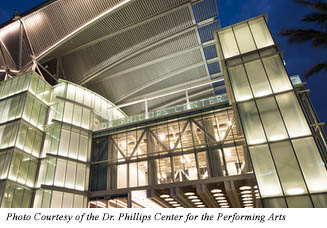DPAC Donation Rankles
It’s Coming Around Again
|
As Budget Season approaches, the specter of nine more annual $100,000 contributions to Orlando’s Dr. Philips Performing Arts Center (DPAC) remains a bone of contention among Winter Parkers. At the June 9 Utilities Advisory Board (UAB) meeting, a group of citizens voiced their opposition to using the Utilities Fund for any portion of the City’s charitable contributions in the coming 2015-16 fiscal year. In Fiscal 2014-15, two-thirds of the City’s contributions to charitable organizations came from the Utilities Fund, and the Utilities Advisory Board members did not find out about it until April 2015 when they read it in the paper. UAB member John Reker, who was rotating off the board after the June 9 meeting, spoke as a concerned citizen. He stated that utility rates are determined by the Cost of Service and said he does not believe it is appropriate to charge customers for anything other than the cost of delivering water and electricity. Reker was replaced by former Commissioner Barbara DeVane, who was on the Commission when the City purchased the utilities company. At this meeting, DeVane said, “When we bought the utility, we promised the utility money would stay in the utility.” According to the City website, the board’s mandate is to advise “the Mayor and City Commission on matters regarding the capital needs, rate structures and policies related to the operation of the city’s utilities system.” In other words, the UAB determines how much we pay for water and electricity, and they are responsible for all capital improvements to the system, like undergrounding. How much we pay for our utilities determines how much is in the Utilities Fund to make repairs in the event of equipment failure or power outage, and how long it will take to complete the undergrounding process. The only money the utility company has comes from the rate-payers. Diversion of funds from the Utilities Fund necessarily hinders the performance of their charge. The Winter Park City Charter states: “Transfer or use of collected sewer fee funds for other than sewer purposes must be approved by a voter referendum.” The City Charter was written in 1983, predating the City’s purchase of the utility company. At the time, the only utility Winter Park had was sewer. Since the Charter has not been updated to reflect the current situation, there is no current proscription on diverting electric or water revenues to the General Fund. City Manager Randy Knight pointed out that the UAB operates solely as advisors and that only the City can spend money. He went on to say, just because the City dipped into the Utilities Fund for the FY 2014-15 charitable contributions, that did not mean the City would utilize this fund in future years. Knight acknowledged that he was responsible for using the Utilities Fund for a portion of the charitable donations in last year’s budget, clearly subscribing to the “ask-forgiveness-not-permission” school of thought. UAB Chair Katherine Johnson had prepared a draft memo titled “Proposed Guidance Regarding the Use of City of Winter Park’s Electric Utility and Water/Wastewater Revenues.” She stated that the board was “agnostic” on the subject of the individual donation recipients, but was concerned about the precedent it set. She told the Observer, “This raiding of the utility funds for other purposes is a problem that is systemic in other jurisdictions that I’m familiar with.” She told the Voice that she wanted to ensure that the priority for the utility funds remains focused on long-term capital projects that will improve the safety and reliability of utility operations and that will benefit the utility’s customers. “We already give 6 percent of the utility revenues to the City for the general fund,” said Johnson. “This past year they appropriated another quarter percent,” (amounting to approximately $175,000) “and the funds were redirected without the opportunity for a discussion among UAB members and City staff about the long-term impacts of this decision.”
|


Recent Comments